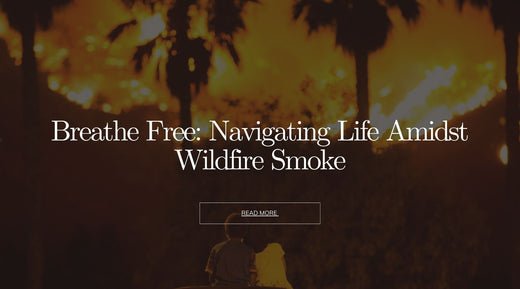Breathe Free: Navigating Life Amidst Wildfire Smoke
In recent years, wildfires have become more frequent and severe, leaving behind trails of destruction and filling the air with hazardous smoke. As the skies turn hazy and the air becomes difficult to breathe, the importance of protecting our health and understanding how to adapt has never been more critical. Here’s how we can navigate these challenging times and ensure we breathe free, even amidst wildfire smoke.
The Health Risks of Wildfire Smoke
Wildfire smoke contains a complex mixture of gases and fine particles, including carbon monoxide, volatile organic compounds (VOCs), and particulate matter (PM2.5). These tiny particles can penetrate deep into the lungs and even enter the bloodstream, posing significant health risks, particularly for:
-
Children and the elderly: Their respiratory systems are more vulnerable.
-
Individuals with pre-existing conditions: People with asthma, chronic obstructive pulmonary disease (COPD), or heart disease face heightened risks.
-
Outdoor workers and athletes: Prolonged exposure during physical activities can exacerbate health issues.
How to Protect Yourself
-
Stay Informed: Keep track of air quality by monitoring reliable sources such as the Air Quality Index (AQI). Apps and websites can provide real-time updates on local conditions.
-
Stay Indoors: Limit outdoor activities, especially during peak smoke times. Close windows and doors to prevent smoky air from entering your home.
-
Use Air Purifiers: Invest in high-efficiency particulate air (HEPA) filters to reduce indoor pollution. If you don’t have one, creating a DIY air purifier with a box fan and a HEPA filter can be an effective alternative.
-
Wear Protective Masks: Not all masks offer adequate protection. Opt for N95 or P100 respirators, which can filter out fine particles. Ensure a proper fit for maximum effectiveness.
-
Create a Clean Air Space: Designate a room in your home as a “clean air zone” with an air purifier, sealed windows, and minimal contaminants.
-
Stay Hydrated and Healthy: Drink plenty of water to keep your respiratory system moist. A healthy diet and regular exercise can improve lung function over time. Consider incorporating natural supplements like Breathe Free Lung Cleanse & Detox into your routine. This product is designed to support lung health by helping to detoxify and rejuvenate your respiratory system, offering an additional layer of protection against harmful pollutants.
Preparing for the Future
Wildfires are a stark reminder of the growing impact of climate change. While immediate measures can help mitigate risks, long-term solutions require collective action:
-
Advocate for Climate Action: Support policies and initiatives aimed at reducing greenhouse gas emissions and enhancing wildfire management strategies.
-
Practice Fire Safety: If you live in wildfire-prone areas, maintain defensible space around your home, follow local fire safety guidelines, and have an evacuation plan ready.
-
Plant Trees: Trees not only sequester carbon but also act as natural air filters, improving overall air quality.





